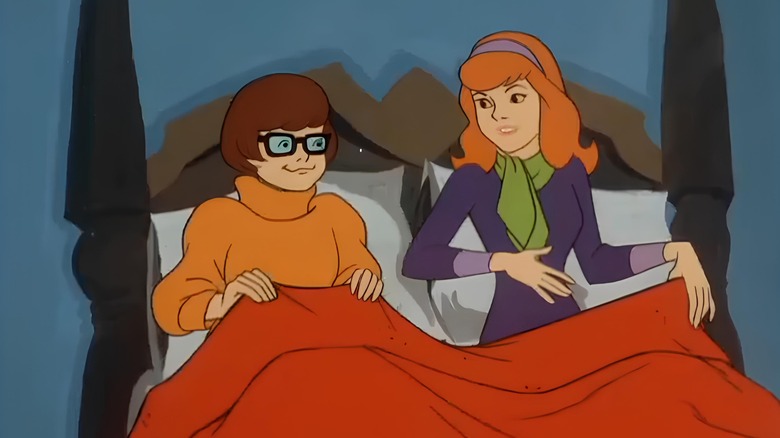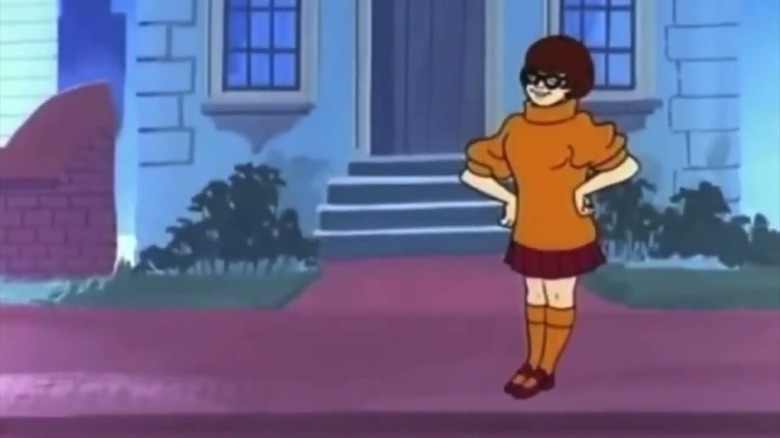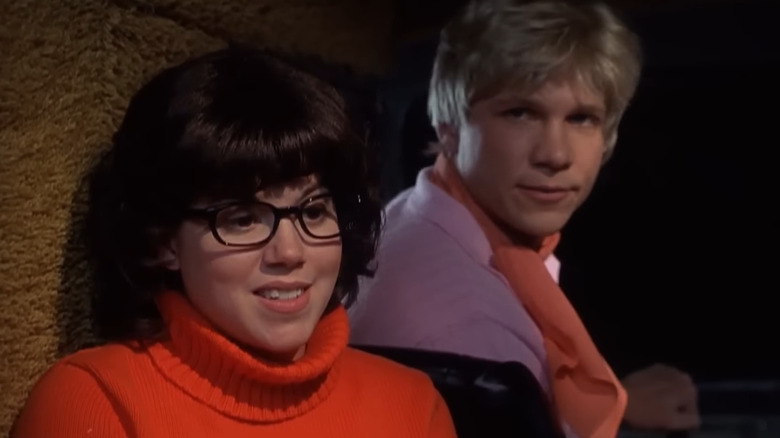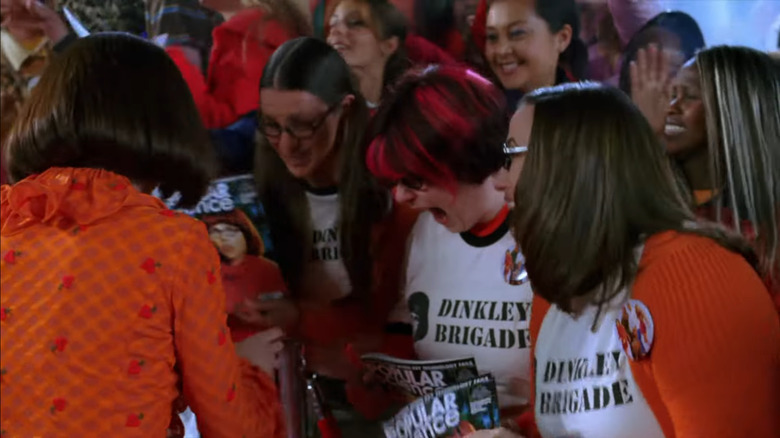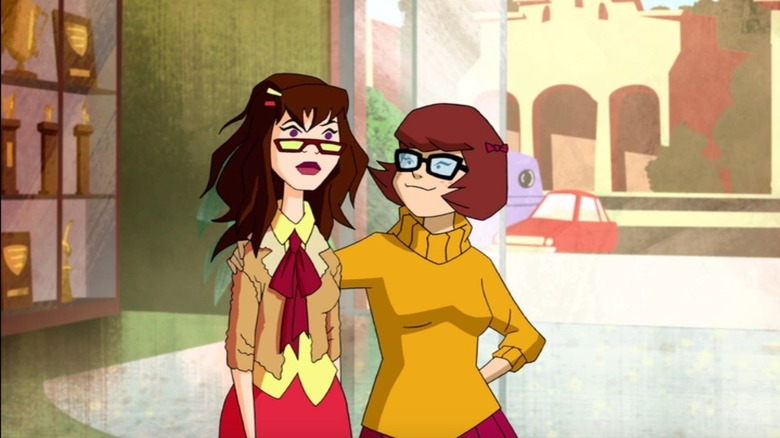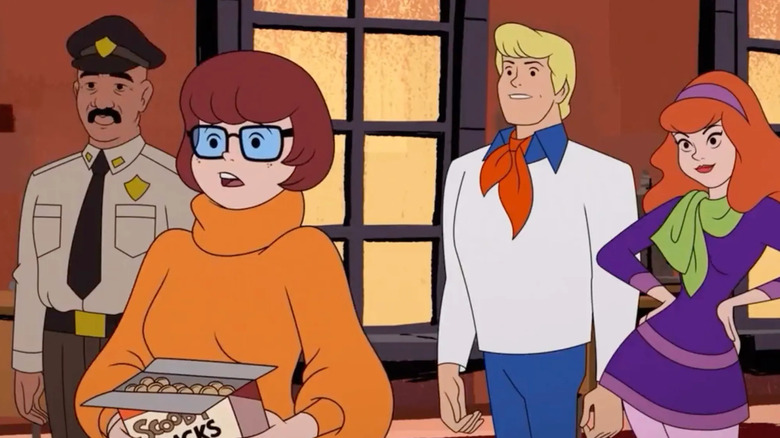James Gunn Wasn't The First Person To Root For Lesbian Velma
On December 31, 2020, film/TV critic David Opie tweeted, "No one is 'born bi,' you watch 'Scooby-Doo' at a formative age and the whole cast turns you bi." The post, featuring photos of the cast of the 2002 "Scooby-Doo" movie, received 19,000 retweets and 135,000 likes, which might seem strange considering that there's nothing about the movie that has anything to do with bisexuality. At least, not on paper.
The vibes, however, are indeed pretty queer. The movie stars Sarah Michelle Gellar as Daphne, Linda Cardellini as Velma, and Freddie Prinze Jr. as Fred, all of whom are beloved within the queer community for one reason or another. More importantly, "Scooby Doo" as a franchise has always had a strong queer fanbase. Part of that's due to how the cartoon's aesthetics borrowed heavily from the countercultural movement of the '60s and '70s, and partly it's because of how precious a character Velma is. With her frumpy orange outfit and her general disinterest in romance, Velma made for a strong kids' role model as a woman who was valued for her brains, not her looks, and who was never asked by the rest of the gang to change this aspect of herself.
Because Velma already breaks with a lot of gender expectations simply by existing, it wasn't a stretch for some viewers to start speculating. After all, it is sort of suspicious that she could recognize Daphne's moans like that, and it seems odd that all the male love interests she does get tend to quickly fizzle out. She's never had chemistry with men, no matter how much the writers tried to give her some. The result is that the Gay Velma Theory was more popular than even the Gay Fred Theory, and became a constant running joke among the fandom.
In the wake of the explicitly gay Velma in 2022's excellent "Trick or Treat Scooby-Doo!", not to mention the bisexual Velma in the less excellent Max series, younger fans often point to the 2002 "Scooby-Doo" movie as being what helped it all happen. Velma wasn't a lesbian in that film, but writer James Gunn totally wanted her to be one — only to have her queerness repeatedly shut down by the Warner Bros higher-ups. But it's worth remembering that Gunn was basing his lesbian Velma plan on fan theories that were already popular, and already being acknowledged in newspapers around the country.
Is Velma gay? The nation's top journalists were on the case
Two writers for The Hartford Courant, Greg Morago and David Daley, wrote a piece in March 1999 speculating on the sexualities of plenty of famous cartoon characters, from Barney the Dinosaur (described as a "limp-wristed violet blob") to Big Bird ("one big walking, flapping drag show"). They threw some shade on Fred Jones — "Daphne? More like denial" — then finally gave Velma a shoutout, albeit in a section about the "Peanuts" cast: "Marcie needs to meet Velma from 'Scooby-Doo.' She's a total tomboy who wants an authoritative master, always referring to Peppermint Patty as 'sir.'"
Earlier, in a '98 article in the Fort-Worth Star Telegram, Eric Celeste tried to "dispel" the many misconceptions about the Scooby gang over the past few decades:
"Misconception: Velma — the frumpish nerd with a unisex haircut — is a lesbian. Consider what she said after her comely sidekick, Daphne, delayed the mystery-solving picture taken: 'Women! Wait a minute. What am I saying? I'm a woman!' Our Theory: When you're right, you're right.")
There was also a 1997 piece in the Hattiesburg American responding to the aftermath of Ellen DeGeneres' famous coming out moment on her own TV show. The piece seemed to be written to counter the "what about the children?!" moral panic surrounding the episode, with the author describing how little his kid was harmed by the whole thing. The author signed off saying, "In the overall scheme of things, Ellen's announcement doesn't mean that much to him. But if 'Scooby Doo' co-star Velma ever comes out, he'll have some explaining to do..."
These mentions are fascinating, in part because of how empty the newspaper archives are of any queer "Scooby Doo" takes prior to the late '90s, even though we know damn well viewers were joking about the topic far earlier. Acceptance of gay rights in America shifted quickly throughout the mid-'90s to the 2010s, and you can trace some of that change through the spike in gay Velma references in America's newspapers, which was apparent even before Hollywood started to get in on the theory.
Before Scooby-Doo (2002), there was Jay and Silent Bob Strike Back
In 2001, the stoner comedy classic "Jay and Silent Bob Strike Back" featured a sequence in which the main characters get in a van with the Mystery Inc. gang. Both Daphne and Velma are hyper-sexualized in this clip, which makes sense given that it's all a hallucination from horny Jay, but it's only Velma who's written as being into girls. "I wish they were hitchhiking girls," she says about Jay and Silent Bob, "Sexy hitchhiking girls."
Is this ideal lesbian representation? Not exactly, but it is an interesting reflection on the perception of Velma in the "Scooby-Doo" fandom at the time, and in the larger culture. In a vacuum, there was a 50-50% chance that Daphne would've been picked to deliver the "sexy hitchhiking girls" line, but in reality I don't think anyone was surprised the movie chose Velma for it.
James Gunn's "Scooby-Doo," released a year later, was also aiming for some Gay Velma humor. Most famously, Gunn intended there to be a kiss between Daphne and Velma. One of the deleted scenes also includes Velma drunkenly singing "Can't Take My Eyes Off You" to (arguably) Daphne, and another deleted scene featured a possessed Velma "getting her swerve on" in the girl's locker room. As one of the comments on the former deleted scene reads, "Why is every deleted scene just Velma doing weird s—."
The answer is that Velma's sexuality was supposed to be an ongoing thread throughout the film, but because the studio wanted to keep it "safe" and family friendly, most of the scenes related to this were either cut from the final product or erased from the script entirely. It's also worth noting that Velma's sexuality in the initial draft, at least in how it comes off from hearing about it, didn't seem to be a serious character arc or a meaningful bit of representation for the queer community, so much as a light-hearted, kind of sleazy way to appeal to the straight guys in the audience.
When asked about the issue in 2020, Gunn tweeted, "In 2001 Velma was explicitly gay in my initial script. But the studio just kept watering it down and watering it down, becoming ambiguous (the version shot), then nothing (the released version), and finally having a boyfriend (the sequel)." Even still...
The queerness of 2002's Scooby-Doo: obvious even at the time
Although people today often talk about Gunn's plans for lesbian Velma as if it were a recent revelation, back in 2002 the cast was pretty open about it. A June 2002 article from the Associated Press noted that, "The original script featured a scene in which Fred gazed lustfully at Daphne while she was leaned over him to load luggage into an airplane's overhead bin. The camera then panned to Velma, who was ogling her too.
"We played on all those things," said Shaggy actor Matthew Lillard at the time. "Is Velma gay? Is Shaggy high? Are [Fred and Daphne] hooking up? All those jokes were in there, but we found at the end of the day it was more important to go the other way ... and that was to be more family oriented."
The main difference is that in 2002 the creatives involved were acting like the choice to downplay Velma's sexuality was their own, not the studio's. "If it becomes overt, then it sort of ruins what was always fun about the show: You thought you were the only one who figured it out," said director Raja Gosnell. James Gunn said that he was "pretty sure [Velma's] gay. So we had a couple little nods to that in the movie and in the end, again, they were things that kind of [detracted from] the scenes."
Was Gunn being genuine when he said this, or was he simply being diplomatic towards the studio at a time where he wasn't yet an established Hollywood name? It's probably the latter, but either way the Gay Velma rumor was now stronger than ever, which you can still see on display in America's newspapers. In a 2004 piece for The Tribune speculating over which political party cartoon characters would vote for, Patrick S. Pemberton argued that Velma would vote for the Green Party — "If you believe all the rumors, Velma will back the party that supports gay marriage," he wrote, adding, "See also: Peppermint Patty, Robin, Scrappy Doo."
The Gay Velma Theory persisted, despite Warner Bros' attempts to shut it down
The 2004 film, "Scooby-Doo 2: Monsters Unleashed," attempted to quell any rumors of lesbian Velma by giving her a boring male love interest, but viewers didn't fall for it. One Canadian reviewer, J. Kelly Nestruck, responded in Toronto's National Post at the time, saying, "In a further betrayal of the original, the ambiguously lesbian Velma is now hot instead of squat and has a male love interest (Seth Green). Is nothing sacred?" Nestruck's full review elaborated on this critique:
"Another thing that made the original series so fab was Velma, cartoondom's first lesbian, albeit ambiguously so. Short, squat and smart, Velma didn't take no guff. She was the brains of the operation, even if an animated glass ceiling prevented her stealing the leader position away from boring, ascoted Fred. Though Velma needed a love interest like a fish needs a bicycle, the filmmakers provided her with one here anyway. And going against the sly allusions of the first flick, it's a man."
Nestruck also wasn't impressed with the sequel's Sexy Velma storyline. Although the storyline forever altered the psyches of millions of young viewers, for an adult critic the larger implications were too troubling to ignore. He wrote, "In presenting a beautiful woman as plain and then saying it's OK to be plain (read: beautiful), the film sends mixed messages and steals away a role model from short, stubby and/or ambiguously lesbian children."
The mid-2000s were a big time for gay Velma jokes in North American newspapers. At this point, gay marriage was on the cusp of becoming more supported than opposed by the public, but the anti-gay side was fully prepared to raise a big fuss over it. In 2005, Toronto's National Post once again got in on the Velma commentary, this time with a satirical article mocking right-wing panic over supposed LGBTQ+ brainwashing in kids' cartoons. The piece joked that although Velma was supportive of the cause, it was actually Daphne who was bi while Velma was "just a militant feminist, not gay."
2006 also brought us another lesbian parody version of Velma in Adult Swim's "The Venture Bros." The October 2006 episode "¡Viva los Muertos!" depicts Velma (well, "Val") as a hardcore chain-smoking lesbian who regularly quotes passages from the 1967 SCUM Manifesto. It was insane. But a few years later, the "Scooby-Doo" franchise would grow tired of Velma's queerness only being shown in non-canon parodies or little winks to the LGBTQ+ section of the audience. In 2010 came the two-season show "Scooby-Doo! Mystery Incorporated," where Velma's sexuality became more than just a joke in a newspaper.
How 'Mystery Incorporated' broke the gay ceiling
"Scooby-Doo! Mystery Incorporated" is one of the more interesting entries in the franchise, as its serialized approach allowed for more complicated, mature storylines, one of which was Velma gradually coming to terms with her sexuality. After starting off the show in an unfulfilling relationship with Shaggy, Velma soon develops what sure seems to be a crush on Marcie Flesh, AKA Hot Dog Water. Throughout the show's two seasons, Velma isn't explicitly a lesbian, but gay Velma truthers still had plenty of material to work with. During Pride Month in 2020, the show's producer Tony Cervone posted the following on Instagram:
"I've said this before, but Velma in 'Mystery Incorporated' is not bi. She's gay. We always planned on Velma acting a little off and out of character when she was dating Shaggy because that relationship was wrong for her and she had unspoken difficulty with the why. There are hints about the why in that episode with the mermaid, and if you follow the entire Marcie arc it seems as clear as we could make it 10 years ago. I don't think Marcie and Velma had time to act on their feelings during the main timeline, but post reset, they are a couple. You can not like it, but this was our intention."
There are a lot of examples of queer-baiting on TV, where the show hints at a queer relationship without any intention of following through, but looking back at "Mystery Incorporated" there's more than enough evidence to show that yes, explicitly gay Velma was clearly where this show would've gone if there'd been a third season.
It's an impressive swing for the time, particularly considering its willingness to be misunderstood throughout that awkward early Velma/Shaggy relationship drama. The show started off with Velma acting oddly out of character in a way that was off-putting to a lot of viewers, and it was only after "The Siren's Song" (twenty episodes in) that most viewers could really see the long game being played here. With Velma, this show displayed a patience and willingness to trust its audience that a lot of TV shows (even for adults) can't muster.
Is Velma gay for good now? It's complicated
While some fans were still in denial about Velma, pointing out how "Mystery Incorporated" never actually outright said what was going on with her, the 2022 Halloween film "Trick or Treat Scooby-Doo!" went and removed all doubt. This version of Velma sees a woman she likes and responds by blushing and having her glasses steam up. Gone are the hints and winks; this Velma is undeniably lusting over a woman, and the scene is not just included in the finished product but advertised by the network ahead of time.
The creative decision got a lot of praise from some fans and a lot of groans from others, but perhaps the most notable reaction came from Hayley Kyoko, who played Velma in the live-action films "Scooby-Doo! The Mystery Begins" (2009) and "Scooby-Doo! Curse of the Lake Monster" (2010). She tweeted in response: "I remember booking Velma in 2008. It was my first big role in a movie. I also remember thinking 'I wonder if they know they hired a lesbian as Velma.'"
But does this mean that every version of Velma is gay? Tragically, no. The "Scooby-Doo" franchise has dozens of different continuities and timelines, and every new project tends to give its own unique spin on the gang. Velma's core characteristics are her cleverness, her booksmarts, and her inability to see without her glasses. Her being a lesbian is not a core part of her character, but now we know that being straight isn't a core part of her either. Not every new version of Velma will be gay, but now any new version of Velma could be gay without much controversy, and that at least is worth celebrating.
It's also worth noting just how much Velma has risen in popularity in recent years. Velma was once treated as an afterthought by the broader culture, so much so that in the '80s the marketing team for the (now-discontinued) Vita-Fresh kids' chewable vitamins decided not to include Velma in their "Scooby-Doo"-themed vitamins. If kids wanted to take their daily vitamin, they had the option of pulling a Fred, Shaggy, Scooby or Daphne-shaped vitamin out of the bottle, but no Velma one.
You may be thinking, "Oh, maybe the company was limited somehow to only four gummy shapes," but no, they had a fifth option, and they chose to give it to Scrappy Doo. That annoying brat Scrappy was considered a bigger priority to the Vita-Fresh marketers than Velma was. This omission led to an investigation by Spy Magazine in November 1993, titled "No Velma, No Peace."
Whether you're a fan of explicitly gay Velma or you prefer the times where we got to read between the lines, at least we can all take solace in how Velma is now an undeniably popular character. The "Scooby-Doo" vitamins of today wouldn't dare give Velma the snub.
